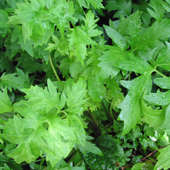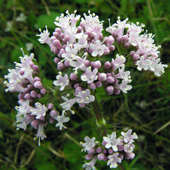Valerian
Herbal Remedies and Medicinal Cures for Diseases, Ailments & Illnesses that afflict Humans and Animals
Aloe Vera •
Astragalus •
Bankoro •
Bilberry •
Bitter Gourd (Ampalaya) •
Bitter Orange •
Black Cohosh •
Cat's Claw •
Chamomile •
Chasteberry •
Coconut •
Cranberry •
Dandelion •
Echinacea •
Ephedra •
European Elder Tree •
Evening Primrose •
Fenugreek •
Feverfew •
Flaxseed •
Garlic •
Ginger •
Ginkgo •
Ginseng (Asian) •
Golden Seal •
Grape Seed •
Green Tea •
Hawthorn •
Hoodia •
Horse Chestnut •
Kava •
Lavender •
Licorice •
Malunggay Moringa Oleifera •
Milk Thistle •
Mistletoe •
Passion Flower •
Peppermint Oil •
Red Clover •
Ringworm Bush (Akapulko) – Cassia alata •
Saw Palmetto •
St. John's Wort •
Tawa Tawa •
Turmeric •
Valerian •
Yohimbe •
accept the bitter to get better
 Valerian Leaves | |||
| |||
 Valerian Flowers | |||
 Valerian Red Spur | |||
| |||
Valerian
The medicinal herb Valerian as an alternative herbal remedy for headaches and depression - Valerian is a plant native to Europe and Asia; it is also found in North America.Common Names--valerian, all-heal, garden heliotrope
Latin Names--Valeriana officinalis
What Valerian Is Used For
- Valerian has long been used for sleep disorders and anxiety.
- Valerian has also been used for other conditions, such as headaches, depression, irregular heartbeat, and trembling.
Herbal Remedy Products with Valerian as part of the ingredients
| |
|
Valerian root has a long and illustrious history and appears in recorded writings from ancient Greece and Rome. It’s well-known for its soothing and calming properties and for its ability to encourage peaceful slumber. Research suggests that natural chemicals found in valerian act on GABA receptors in the brain. Due to its long history of use, valerian has been well-studied. There are also many scientific studies which support its benefits. Marder M, Viola H, Wasowski C, Fernández S, Medina JH, Paladini AC (2003). "6-methylapigenin and hesperidin: new valeriana flavonoids with activity on the CNS". Pharmacol Biochem Behav 75 (3): 537–45. ; Fernández S, Wasowski C, Paladini AC, Marder M (2004). "Sedative and sleep-enhancing properties of linarin, a flavonoid-isolated from Valeriana officinalis.". Pharmacol Biochem Behav 77 (2): 399–404.. Holzl J, Godau P. (1989). "Receptor binding studies with Valeriana officinalis on the benzodiazepine receptor.". Planta Medica 55: 642. doi:10.1055/s-2006-962221. ; Mennini T, Bernasconi P, et al. (1993). "In vitro study in the interaction of extracts and pure compounds from Valerian officinalis roots with GABA, benzodiazepine and barbiturate receptors". Fitoterapia 64: 291–300.
How Valerian Is Used
- The roots and rhizomes (underground stems) of valerian are typically used to make supplements, including capsules, tablets, and liquid extracts, as well as teas.
What the Science Says about Valerian
- Research suggests that valerian may be helpful for insomnia, but there is not enough evidence from well-designed studies to confirm this.
- There is not enough scientific evidence to determine whether valerian works for anxiety or for other conditions, such as depression and headaches.
- NCCAM is funding a study to look at the effects of valerian on sleep in healthy older adults and in people with Parkinson's disease.
Side Effects and Cautions of Valerian
- Studies suggest that valerian is generally safe to use for short periods of time (for example, 4 to 6 weeks).
- No information is available about the long-term safety of valerian.
- Valerian can cause mild side effects, such as headaches, dizziness, upset stomach, and tiredness the morning after its use.
- Tell your health care providers about any herb or dietary supplement you are using, including valerian. This helps to ensure safe and coordinated care.